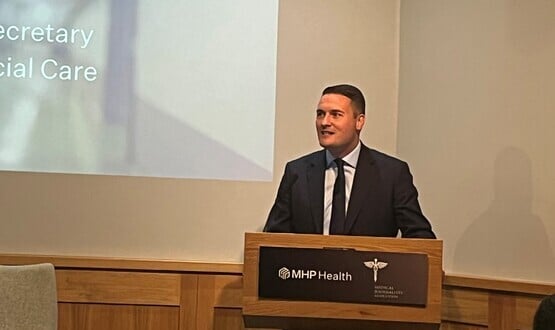Digital choices facing Wes Streeting
- 12 June 2024

Can the next secretary of state for health and social care find a way to ‘move the dial’ on digital? Jon Hoeksma recommends ‘education, education, education’ – and a tough new approach to NHS contracts that have outlived their usefulness
Imagine for a second you are Wes Streeting following the general election. As you settle into the chair once occupied by Matt Hancock (note to self: get a new chair) as the first Labour secretary of state for health and social care in 14 years how do you start to repair the NHS?
Your party has just won a thumping majority, with the public expecting you to sort out the NHS as the first order of business. You’ve promised to clear the 8 million backlog of waiting lists within five years, so the hurdle to clear is already a mile high.
Your policy paper on the NHS, ‘Build an NHS Fit for the Future’, meanwhile, has three broad themes: enable more people to get care at home in their community; build the workforce of the future, backed with the technology they need; and a greater focus on disease prevention.
So, what can you do to turn around a baleful legacy, fulfil your policy aspirations, and get the NHS back to good health?
Top of the list must be to settle the debilitating industrial disputes and help reset the relationship with the workforce. This will surely happen, though it will take time, investment, and compromises to rebuild trust. You are very unlikely to be in a position to give everything the health unions want.
Investment will also need to be found to repair crumbling infrastructure and the NHS estate. Fixing leaking roofs, getting rid of RAAC concrete, and building new hospitals and surgeries doesn’t come cheap. Current public sector budget planning, meanwhile, assumes that capital spending will be reduced. There are no easy answers here.
More promising, is the opportunity to harness digital and data to modernise health and care. Even here, the precarious state of public finances could stifle your ambitions. Can you create enough room to really move the dial on digital?
From existing digital resources, the priority needs to be on modernising infrastructure and training many, many more staff in the necessary breadth of IT, technology, digital and data skills required; areas where there are notable deficits include cyber security, software development and data science. As well as upskilling the current workforce the NHS estimates it will need an extra 30-40,000 digital and data experts by 2030.
Step-change in training and education
Borrowing from the Labour Government of 1997, your absolute digital priority for the NHS should be ‘education, education, education’. To achieve a step-change in the use of digital and data first requires a step-change in the training and education of health professionals.
There has been some progress on training digital leaders through programmes such as the NHS Digital Academy, but not nearly enough. Rather than train a few hundred NHS leaders we now need to digitally boot-strap a much wider workforce, numbering 100,000s. And they require training in a much greater breadth and depth of digital and data skills.
A much more skilled and knowledgeable digital workforce will be better equipped to make informed technology decisions, and support the modernisation of personalised and responsive digitally enabled health services.
An important side-benefit will be to wean the NHS off its reliance on IT consultants and contract staff, which syphon off a huge amount of resource.
But to create room for manoeuvre requires a new approach. In other words, re-directing current resources locked into existing programmes, services, and contracts into more productive areas.
Cancel costly, ineffective programmes
First, cancel programmes and projects that offer few benefits and invest instead in public interest technologies and platforms, which place the user, be they NHS professional or patient, at the centre of technology.
Your aim should be to make pragmatic use of open platforms and standards, and where appropriate, commission development of software and platforms, starting with back office systems.
A good starting point is the re-procurement of the £1.7 billion NHS Electronic Staff Record, the eye-wateringly expensive HR and finance system currently run by Oracle.
Rather than re-procure the contract as currently planned the NHS could instead build its own, as it is already doing for the replacement of NHS Spine. This could also extend to replacing extremely expensive niche systems such as staff rostering.
As other major platform and service contracts come up for renewal, they should be tested against this question: can the NHS use open platforms to develop more cost-effective replacements? If the answer is yes, the contract should not be renewed.
Second, the NHS should decommission platforms that may once have served a purpose but no longer reflect the reality of the health service or have simply outlived their usefulness or achieved what they were meant to.
A good example here is the national e-referral system. Designed to fulfil a policy imperative of patient choice, it has become a pointless bureaucratic monster. Many hospitals reschedule almost every appointment made on e-referrals.
Third, the NHS needs to reduce its costly long-term reliance on a handful of suppliers, whose monopoly market position leave the NHS over a barrel when it comes to negotiating prices.
Invest in NHS-owned platforms
In the EPR space this is particularly apparent in the primary care market where inept NHS policy-makers have engineered a duopoly of two suppliers, EMIS and TPP, and then utterly failed in their efforts to mitigate the consequences and create a competitive market.
The best way to loosen the noose of the primary care duopoly is to strategically invest in the development of an NHS-owned open EHR platform, starting with primary care. Even better, would be an open shared record platform serving an integrated health community, and ultimately the patient.
There are good examples already, OpenEyes, the widely used opthalmology EPR, being the best known.
Creating a fund of say just £50m a year to selectively invest in open platform public interest technology would, over the medium term, have the potential to transform the NHS relationship with incumbent monopoly suppliers, and enable the NHS to start to redefine how it uses digital and data to support future patient care.
None of this will be easy, of course. Health and social care is one of the most demanding, and unforgiving, jobs in government. But there is a huge opportunity to be had in digital. You need to be brave, put the work in, and take it.
 Jon Hoeksma is editor-in-chief and CEO of Digital Health
Jon Hoeksma is editor-in-chief and CEO of Digital Health





5 Comments
Hi Sean – agree that retention not just about training, and that pay rates key as well. But in too many NHS organisations, and particularly in London, very expensive contractors are a necessity because it’s impossible to recruit or retain staff with necessary skills. The cost is not just financial – it’s very difficult to build and maintain effective teams with in-depth experience health requires when largely composed of contractors.
How easy it is to blame ‘inept NHS policy makers’ for every problem in the NHS. I guess it takes a lot longer to explain that bad policies (and there are some) are a small part of a far more complex reason why the NHS is struggling with Digital. Private company legal teams need to take some of the blame as good work gets blocked because of commercial interest. NHS staff, patients and lobby groups also play a part as whilst their motives are good they often don’t see the bigger picture. Arguably the blocking of various NHS data platforms in the past has helped Palantir get their contract. Digital companies can lack insight into the NHS but sometimes just lack ambition and drive. Other factors include funding, political, the complexity of the NHS and, dare I say it, the Media.
You are right to highlight some of the problems with the primary care duopoly but fail to mention the NHS New Market Entrant programme which is actively supporting new system providers to enter the GP market. We are within months of the launch of the first new primary care system in over 25yr. With others coming after that. Plus reforms to existing frameworks to increase supplier accountability.
Some really good points made – particularly that it is not simple. But I do think that in key areas the root cause really is chronic recurring failures from policy makers and national leaders. Yet failure rarely appears to have career consequences and zombie projects go on year after year.
On the primary care market we have been told that we are at the cusp of a brave new market for well over a decade and yet the market keeps contracting. A handful of pilot practices in Birmingham is not going to shake up the market. I hope you are right but delivery is what counts.
On Palantir and the suggestion that this opening was created by privacy campaigners and the media, I’d say this is trivial compared to the complete mess politicians and policy makers – most notably Jeremy Hunt and Tim Kelsey – made through sloppy and cavalier approaches to patient privacy and consent, effectively making Care.data impossible.
If you want to reduce reliance on contract staff you’ll need to bring the pay of digital staff into line with the private sector, ie increase by 50-70% and create regional specialist posts to cover rare skill sets.
Just training existing resources won’t work, you’ll need to deal with structure, progression recruitment and retention as well.
It’s easy to critcise inept policy makers particularly when they tolerate a culture in which they can’t engage in open debate with the NHS IT community except under a nom de plume. Until we fix that culture the debacle will continue.
Comments are closed.